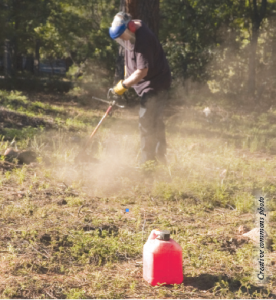 Cleaner, healthier, and better for the environment, the Municipality of Jasper has begun testing an alternative fuel for small engines, such as weed whackers and chainsaws.
Cleaner, healthier, and better for the environment, the Municipality of Jasper has begun testing an alternative fuel for small engines, such as weed whackers and chainsaws.
The trial project intends to replace traditional gasoline with Aspen Alkylate Petrol, which is considered an environmentally friendly alternative.
“One of the main reasons that we got involved with it is the stability and the shelf life of the product and the fact that it doesn’t evaporate and plug up our engines,” said Don Smith, Jasper’s deputy fire chief.
According to Lantmännen, the Swedish company that makes the product, the fuel can last up to five years without deteriorating and doesn’t contain unsaturated hydrocarbons, eliminating the build-up of resins in carburetors, valves and pistons, thereby reducing maintenance costs.
In comparison, regular gasoline lasts between three to five months and can be harmful to engines that sit unused for long periods of time.
Smith also touted the fact that the fuel burns a lot cleaner, reducing harmful emissions.
“A lot of times we are operating inside a building, and if we’re trying to rescue somebody we don’t need to add exhaust fumes into everything else that’s already going on,” said Smith, explaining the rationale behind the switch.
The municipality’s grounds crew started using the fuel in two of its weed whackers in mid-May and intends to use it for several other tools, including some that operate inside the arena.
“Things like the ice edger operate inside a building, so obviously if we can clean up the emissions it’s much better for the staff and people in the building,” said Smith.
Produced in Sweden, the fuel is synthetically made from gases released when refining oil. The gases are heated up in an ethane cracker that becomes so hot that it breaks apart the molecular bonds holding the gases together to form liquid alkylate.
The alkylate is then mixed with other components to create the final product.
According to Lantmännen, the fuel contains 99 per cent less harmful hydrocarbons compared to regular gasoline. This means that the exhaust fumes are much cleaner, reducing health risks.
The fuel also produces 40 per cent less tropospheric ozone, a greenhouse gas that causes global warming.
The trial project was spearheaded by the emergency services department in conjunction with the municipality’s operations and fleet department, and public works department.
According to Smith, the fire department will slowly phase in the fuel for its small engines, such as generators, chainsaws, pumps and hydraulic tools like the Jaws of Life.
To accommodate the different types of engines, there are two different types of fuel, Aspen 2, for two-stroke engines, and Aspen 4, for four-stroke engines.
Smith said the town initially purchased about 200 litres of fuel in various container sizes.
“For us a couple of hundred litres might be a year’s worth,” said Smith, explaining that the emergency services department doesn’t keep track of how many litres of fuel it uses for its smaller machines.
“There are performance advantages to it too,” he said. “It’s high quality, high-octane fuel so it runs better than regular gas and that’s important to us in things like the hydraulic pumps because they might sit for a while.”
A litre of fuel costs about $7 or $8, but can cost up to $12 a litre for regular consumers, explained Smith.
Paul Clarke [email protected]
